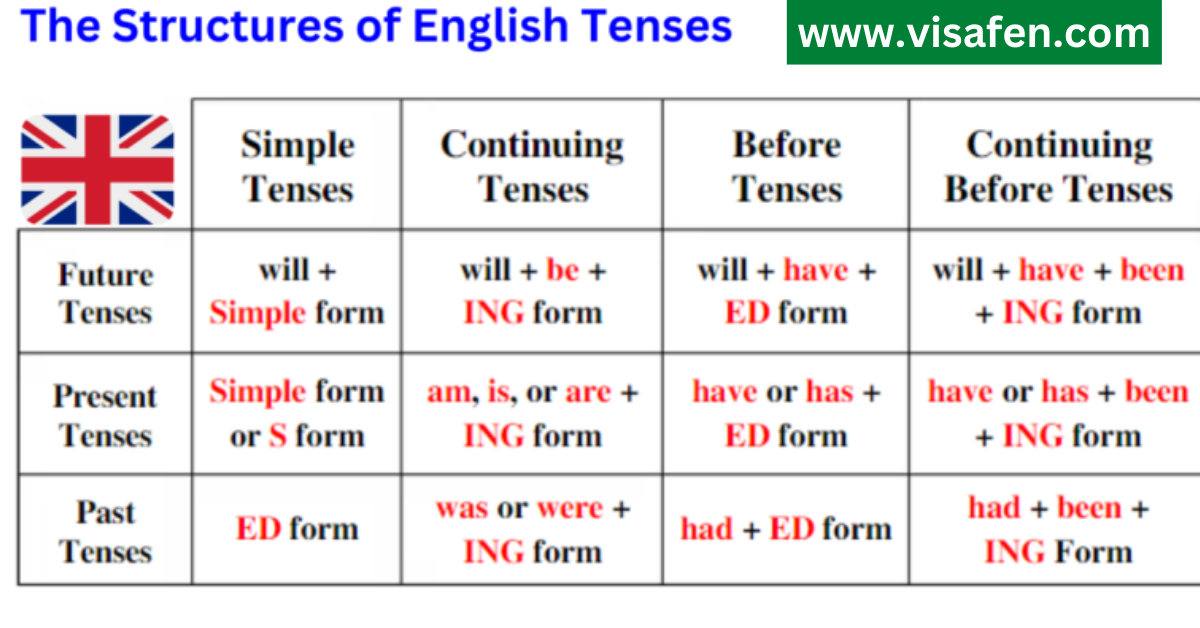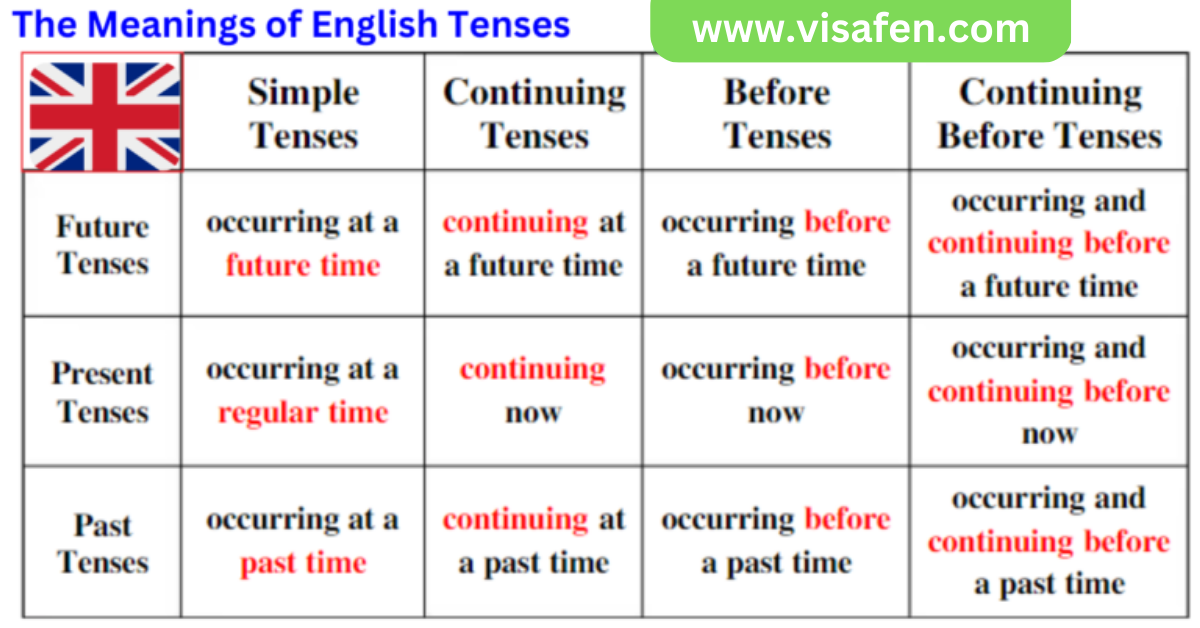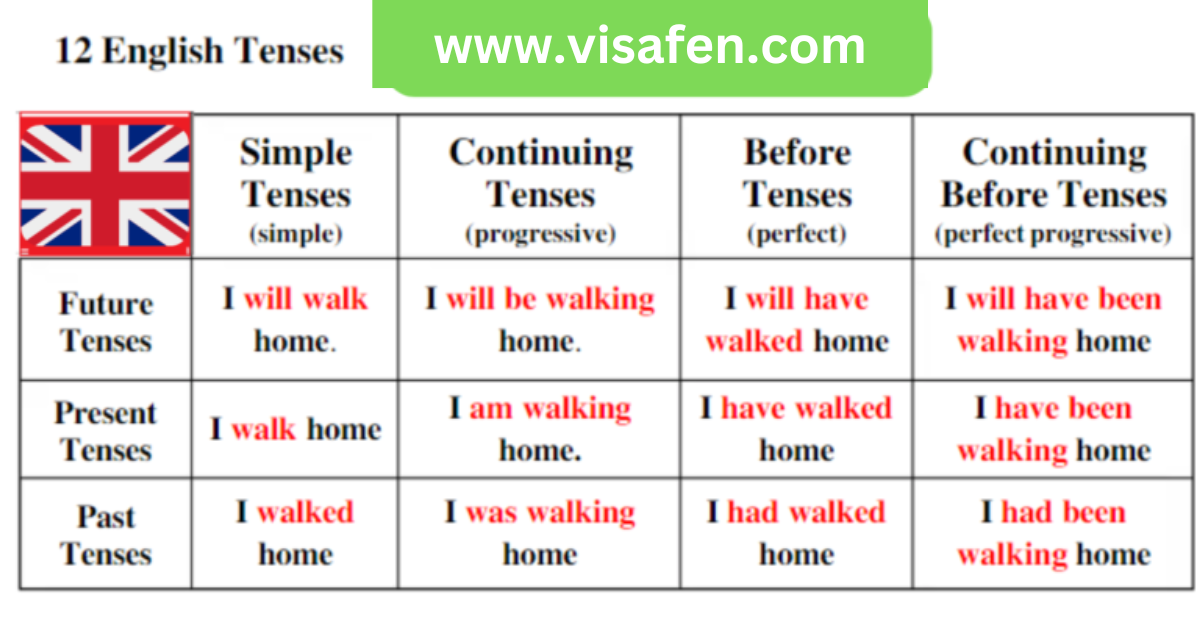Future Perfect Tense
Learn English tenses -Future Perfect Tense
English Grammar Test | – From Here
The English Tense System
The links below are to lessons for each of the 12 basic tenses.
In each lesson we look at two aspects of the tense:
- Structure: How do we make the tense?
- Use: When and why do we use the tense?
Some lessons look at additional aspects, and most of them finish with a quiz to check your understanding.
Present Perfect Continuous Tense
Future Perfect Tense
Future Perfect Continuous Tense
Tenses
We use different tenses to describe the time that the verb refers to.



Future Perfect Tense
We use the future perfect tense when we view events from a future point in time, and talk about events that happened up to and before it.
Forming Future Perfect with will:
| Subject | Will | Have | Main Verb (Past
Participle) |
Rest of Sentence |
| I, you, he, she, it, we, they | will | have | prepared | dinner by the time you arrive. |
Forming Future Perfect with going to:
| Subject | Present Tense “To Be” verb | Going To | Have | Main Verb (Past Participle) | Rest of Sentence |
| I | am | going to | have | prepared | dinner by the time you arrive. |
| You, we, they | are | going to | have | prepared | dinner by the time you arrive. |
| He, she, it | is | going to | have | prepared | dinner by the time you arrive. |
Using the Future Perfect Tense
A Completed Event Before a Future Point in Time
Use this tense to talk about something that will happen before a specific time in the future. Time clauses beginning with “by,” “by the time,” “when,” and “before” and using verbs in the simple present are often used to express the “specific future time.”
- By the time I am 35, I will have been to all seven continents.
- In October, I’m going to have lived in this apartment for a year.
- My mom hopes she will have retired by the time she is 65.
- By 6:00 pm, I will have finished my work, and I could meet you for dinner.
Note: Like all perfect tenses, we don’t know when exactly the main action happened, but just that it happened before a specific point in time.
Duration up to a Future Point (for Stative Verbs)
Use this tense to talk about an action that starts and then continues up to a specific point in the future.
Note: The Future Perfect is only used for stative (non-continuous) verbs. For action (continuous) verbs, use the present perfect continuous tense.
- By the time we graduate from college, Beth and I are going to have been best friends for 20 years.
- In 2018, Joanie will have lived in Paris for 3 years.
- Lucy and Daniel will have known each other for 5 years when they get married in June.
Negative Statements
To make negative statements with the future perfect:
add “not” before “going to”
add “not” after “will.” (the most common form is “won’t”)
- I won’t have seen you for ten years when you pick me up tomorrow.
- Satoko won’t have finished her essay by the time it is due.
- Maria and Lucinda aren’t going to have eaten when they arrive.
Question Forms
Information Questions about the Subject:
To make a question about the subject of a sentence, use a question word as the subject. The form is:
question word + will + have + main verb (past participle) + rest of sentence
question word + “to be” verb + going to + have + main verb (past participle) + rest of sentence
- ??? is going to have studied before the test tomorrow. –>
- Who is going to have studied before the test tomorrow?
- ??? people will have ridden on the rollercoaster before it’s torn down. –>
- How many people will have ridden on the rollercoaster before it’s torn down?
- ???’s sister will have taught the kids to sing in time for the Christmas show. –>
- Whose sister will have taught the kids to sing in time for the Christmas show?
Questions about the Verb or Words after the Verb:
To make a yes/no question about the verb or words after the verb with the future perfect tense, put either the “will” or the “to be” verb before the subject:
Will + subject + be + main verb (present participle) + rest of sentence
“To be” verb + going to + main verb (present participle) + rest of sentence
- Are you going to have drunk too much by the time you leave the party?
- Will you have decorated the house before the guests arrive?
- Will Sally have prepared a room for me by the time I get there?
- Is she going to have paid the phone bill before it’s overdue?
To make an open-ended question, put a question word (who, what, where, when, why, how) at the beginning of the sentence.
- Why are you going to have drunk too much by the time you leave the party?
- What will you have decorated the house with before the guests arrive?
- Who will have prepared a room for me by the time I get there?
- How is she going to have paid the phone bill before it’s overdue?
Future Perfect Uses
The future perfect is complicated to form, but has one simple use:
to view a completed action or event from a particular point in the future. The event described is incomplete (or has not started) in the present.
He will have read the book by tomorrow. (But he has not read it now.)
The future perfect is therefore used to describe something that will be complete at a certain
point in the future.
They will have learned everything by the end of the year.
It should not be confused with the other future tenses, as it is the only future tense that tells us a verb will be complete. The simple tenses can show intent to finish, but the future perfect shows something will be finished at a certain time.
I will finish my book tomorrow. (The action is planned to be completed at a
future time.)
I will have finished my book tomorrow. (The action will be completed at a future time.)
Are you ready to see how well you know the Future Perfect Tense ?
Try this fun QUIZ .
English Grammar Test | – From Here
